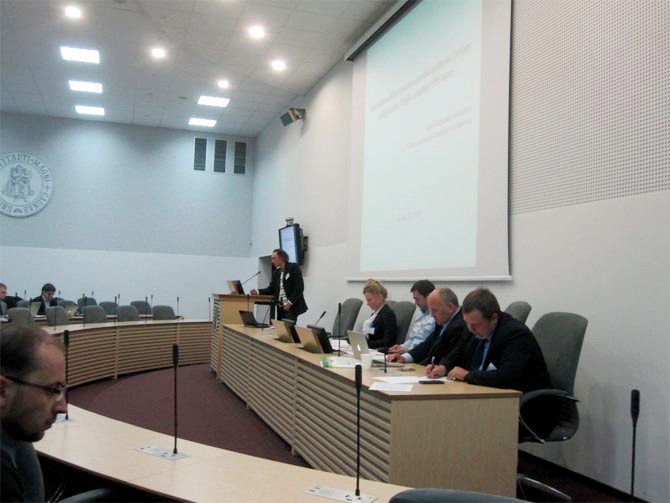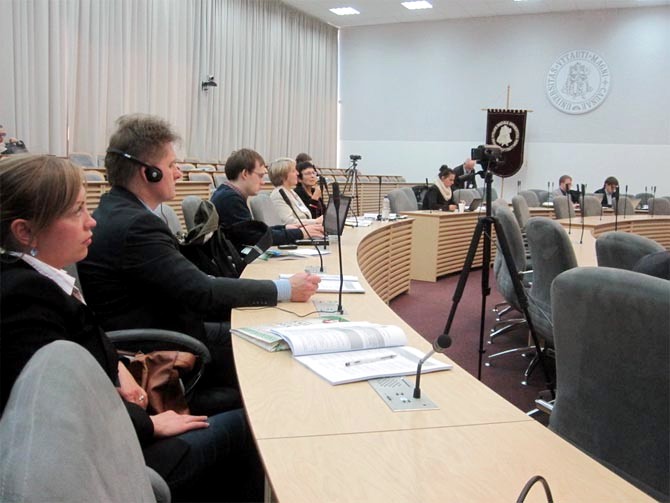Poland and Germany were both initiators and drivers of a New Eastern policy linked to the Eastern neighborhood and Russia/Soviet Union.
Uladzimir Matskevich: Four Congresses do not make history yet! (Photos)

The 4th International Congress of Belarusan Studies ended in Kaunas (Lithuania).
Uladzimir Matskevich, the head of the Board of the International Consortium “EuroBelarus”, draws the results of the Congress. Let us recall that EuroBelarus Consortium was among the organizers of the forum.
— How do you assess the results of the Congress for Belarusan researchers that took place in Kaunas on October 3-5?
— As it often happens with large-scale events, there were both successes and failures. There are several directions and sections that demonstrate efficiency, richness of content, and are interesting from year to year. These are historians, who hold several sections and bring something new each year. We have strong — section for Biblical studies and translation difficulties; the same can be said about culturological direction and linguistics.
Economic direction turned out to be the weakest section this year. I got fully disappointed with the section on problems in education. All in all, all directions that have to do with specific research of social, political, cultural problems leave much to be desired. There are good reports, and certain research, such as the research on the potential of the solidarity in the Belarusan society; however, they don’t have the key role. Practical research comes to be far from the modern reality, either carried away with trendy topics or suffering from self-censorship and political correctness.
For a number of years the Congress is continually delighting us with the wide representation of foreign specialists and scientists. Belarus is not in the centre of attention when it comes to the world science, but scientists of different scientific braches from all continents demonstrate their interest to it. And it is the Congress that enables everyone to meet and take a closer look at each other’s approaches and scientific results.

— The Congress already has its history and its traditions. How is the 4th Congress different from all the previous ones? How has its professional level developed?
— The presence of traditions is indeed becoming noticeable. But four Congresses do not make history yet! These are attempts and mistakes; seek for strong and weak sides in Belarusan philology. The level is hard to assess; all assessments are highly subjective. No one from the participants of the Congress is able to embrace everything. More than 400 participants, 20 sections and groups, several round table discussions that are run simultaneously and dozens of reports. It is very important during the first stages of the Congress’ development. And dealing for a rise is important, too. If in some disciplines or directions we see weaknesses and flaws, it means that we have something to improve. But for now I would refrain from assessments; it is too early to judge.

— What influence did the situation in Ukraine made on the Congress of Belarusan Studies?
— Ukraine was present at the Congress in all the different aspects: from the specifically organized panel discussion on the situation in Ukraine and Belarusan foreign policy to invisible and implicit context and the content of different reports. Ukrainian researchers and philosophers also took active part in the Congress. They don’t lose interest to Belarus, and this interest seems to be bigger than our interest to Ukraine from the point of view of research and analytics. As citizens, we all take interest in Ukraine and worry about Ukraine. But from the point of view of science it is different, which reminds the state our social and humanitarian sciences are in.
We have talented young, entry-level, experienced, and entitled scientists, experts, and specialists no worse than in Ukraine, but who work on their own. And today only teams, collectives, communities are able to do research and analytics. In this sense Congress is an irreplaceable event.

EuroBelarus Information Service
Others
-
Uladzimir Matskevich: The sooner the "Union State" is denounced, the better for Belarus
Not only does the “Union State” undermine the establishment of civilized relations with Europe, but it hinders the possibility of normal relations between Belarus and Russia.
-
Uladzimir Matskevich: The regime can no longer control the situation in the country
The authorities are unable to prolong the social contract with the people: there is no way out of the social crisis.
-
Press release of the BNP in connection with the next round of the dialogue in the format of the EU-Belarus Coordination Group
Belarusan National Platform of the Eastern Partnership Civil Society Forum welcomes the dialogue process in the format of the EU-Belarus Coordination Group, the third round of which was held in Minsk on 3-4 April 2017.
-
Hennadiy Maksak: Europe must react adequately to the events in Minsk
A new wave of political repressions should make the EU return to tougher policy towards the Belarusan regime.








Comments
From farewell to a new Eastern policy and towards a new development
Poland and Germany were both initiators and drivers of a New Eastern policy linked to the Eastern neighborhood and Russia/Soviet Union.